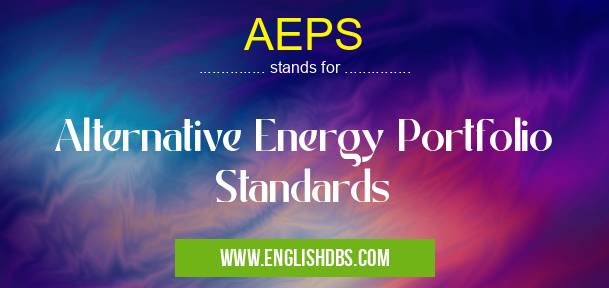What does AEPS mean in ENERGY
Alternative Energy Portfolio Standards (AEPS) are a set of regulations or laws put in place by some governments to ensure their power industry increases the share of energy coming from renewable sources. AEPS requires electricity suppliers and individual consumers to achieve a certain percentage of renewable energy use over time. The primary goals of alternative energy portfolio standards are to reduce emissions, increase energy security, and create jobs in green energy industries.

AEPS meaning in Energy in Governmental
AEPS mostly used in an acronym Energy in Category Governmental that means Alternative Energy Portfolio Standards
Shorthand: AEPS,
Full Form: Alternative Energy Portfolio Standards
For more information of "Alternative Energy Portfolio Standards", see the section below.
» Governmental » Energy
What is AEPS?
AEPS is an acronym for Alternative Energy Portfolio Standards. These standards are put in place by governments to ensure that their power generation companies obtain a specific portion of their energy from renewable sources such as solar, wind, biomass, small-scale hydroelectricity and geothermal power.
The goal of these standards is to reduce emissions, diversify the sources of energy generation and create jobs in green industries. To meet the requirements set forth by AERs, utilities must purchase Renewable Energy Certificates (RECs) that represent the production of one megawatt-hour (MWh) or 1,000 kilowatt (KW)-hours of electricity from eligible renewable resources. Utilities then sell all or part of these RECs onto customers who are looking to meet their own alternative energy goals.
How does it work?
When setting Alternative Energy Portfolio Standards (AEPS), governments may have different objectives and goals when it comes to switching over to clean renewable energies. As a result, each government will create its own unique set of standards which could range from using only certain types of technology such as solar or wind power, setting minimum rates for investments into renewable projects or targeting certain percentages for how much electricity needs to come from renewable sources annually.
Once these standards have been established utilities can comply with them by either directly investing in new renewables projects or buying certified Renewable Energy Certificates (RECs). RECs represent the environmental benefits achieved through replacement or avoidance of conventional fuels used for electricity production with cleaner ones such as solar and wind energies, for example. When utilities buy RECs they can apply them against their compliance targets while simultaneously helping other developers promote and finance further clean electricity projects across the country or region being targeted by the AEPS regulations.
Essential Questions and Answers on Alternative Energy Portfolio Standards in "GOVERNMENTAL»ENERGY"
Alternative Energy Portfolio Standards are a key policy mechanism that governments use to help accelerate their transition towards greater reliance on clean renewable energies like solar and wind power. These regulations help incentivize investors to make long-term commitments towards increasing clean energy production while also empowering citizens to become more active participants in transitioning away from fossil fuels by buying RECs themselves and meeting their own personal environmental goals whenever possible.
AEPS also stands for: |
|
| All stands for AEPS |
